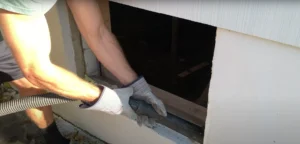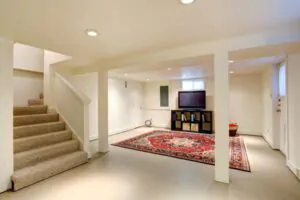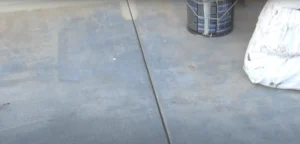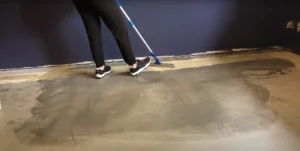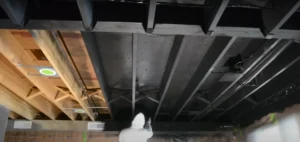Finishing a basement yourself can be a challenging task. Many homeowners wonder, “How long does it take to finish a basement yourself?” The answer isn’t simple. It depends on various factors like the size of your space and the work needed.
On average, finishing a basement takes about five weeks. This timeline can stretch from three to eight weeks, based on your project’s scope. Our guide will help you understand the steps involved and how long each might take.
We’ll break down the process into manageable phases and offer tips to speed things up. Get ready to transform your basement into a functional living area.
Key Takeaways
- Finishing a basement yourself takes about 5 weeks on average, ranging from 3 to 8 weeks based on project scope.
- Basement size greatly impacts timeline – a 500 sq ft space may take 4 weeks, while 1,000 sq ft could take 6+ weeks.
- Basic finishes cost around $25 per square foot, while high-end options can reach $50+ per square foot.
- Key project phases include framing (3-5 days), electrical/plumbing (3-5 days), drywall (5-10 days), painting (2-3 days), and flooring (3-5 days).
- Good planning, proper tools, and quality materials can speed up the process and lead to better results.
Key Factors Influencing the Timeline
Several factors affect how long it takes to finish a basement. The size, desired features, and utility needs all play a role in the timeline. These elements shape the scope of work and influence the project’s duration.
Basement Size
Basement size plays a big role in how long it takes to finish. A larger space needs more work and materials. This means more time for each step of the project. For example, a 500-square-foot basement might take about 4 weeks to finish.
But a 1,000-square-foot space could take 6 weeks or more.
The layout of your basement also affects the timeline. A simple, open plan is faster to finish than a complex design with many rooms. Each wall you add means more framing, drywall, and painting time.
Odd shapes or angles in the space can slow things down too. They often need custom work, which takes longer than standard builds.
The size of your basement is like the canvas of your project – it sets the stage for everything else.
Utility needs can change based on basement size as well. Bigger spaces might need more electrical outlets or light fixtures. They could also require extra heating and cooling units.
These additions stretch out the project time. Keep in mind that a larger area gives you more options for how to use the space. But it also means more decisions to make along the way.
Desired Finishes
Finishes you pick for your basement affect how long it takes to complete. Basic finishes like carpet and paint are quick to install. Fancy finishes like custom cabinets or tile work need more time.
A simple basement might take 4-6 weeks. An upscale one could stretch to 8-10 weeks or more.
Your choices impact cost too. Simple finishes run about $25 per square foot. High-end options can push that to $50 or higher. Think about what you want and your budget before you start.
This helps set clear expectations for time and money. It also guides your planning for each step of the project.
Materials play a big role in finish time. Some need special ordering or extra prep work. Others might require skilled workers to install. Plan ahead for these factors. They can add days or weeks to your timeline.
But they often result in a better-looking and longer-lasting basement.
Utility Requirements
Utility needs play a big role in basement finishing. You must plan for power, water, and air flow. Most basements need extra outlets and lights. This takes about 1 to 2 days for basic electrical work.
If you want a bathroom or kitchen, expect 3 to 7 days for plumbing and wiring. HVAC changes may also be needed for comfort.
Your project timeline depends on these utility choices. Simple setups are faster, while complex ones take longer. Make sure to check local codes before starting any work. Getting permits and passing inspections are key steps in the process.
Average Timelines for Each Phase
Finishing a basement involves several key steps. Each phase takes a specific amount of time to complete. Let’s break down the average timeline for each stage of the process.
Framing: 3-5 Days
Framing forms the backbone of your basement project. This phase typically takes 3 to 5 days to complete. During this time, workers will build the walls that define your new space. They’ll use wood studs and plates to create the structure for rooms, closets, and other areas.
Skilled carpenters handle the framing process with care. They ensure walls are straight and level, which is key for later steps. The team will also frame any needed bulkheads for pipes or ducts.
Proper framing sets the stage for smooth drywall installation and finishing work later on.
Good framing is like a strong foundation. It supports everything else in your basement project.
Expect some noise and dust during framing. But the results are worth it. You’ll see your basement layout come to life before your eyes. This step turns your ideas into a real, 3D space you can walk through.
Electrical and Plumbing Rough-Ins: 3-5 Days
Electrical and plumbing rough-ins form a key part of basement finishing. This stage takes about 3 to 5 days to complete. During this time, skilled workers install wiring for lights, outlets, and appliances.
They also set up pipes for sinks, toilets, and showers.
The process starts with marking spots for fixtures and outlets. Next, workers drill holes and run cables through walls and ceilings. Plumbers then lay pipes and connect them to the main water supply.
This step needs care to avoid leaks and ensure proper drainage. After rough-ins, inspectors check the work to make sure it meets local codes.
Drywall Installation: 5-10 Days
Drywall installation takes about 5 to 10 days in a basement project. This phase starts with hanging sheets on framed walls and ceilings. Skilled workers then apply joint compound, tape seams, and sand surfaces smooth.
The process needs time between steps for proper drying. Factors like room size and moisture levels can affect the timeline. A pro team can finish faster, while DIY efforts might stretch longer.
Proper drywall work forms the base for a polished basement look. It covers insulation and wiring while creating even surfaces for paint or wallpaper. Good drywall installation also helps with soundproofing and fire resistance.
Homeowners should plan for dust and noise during this stage. Setting up plastic barriers can help contain mess in the work area.
Painting: 2-3 Days
Painting your basement takes about 2 to 3 days. This step adds color and life to your new space. First, you’ll need to prep the walls and ceiling. Then, apply primer and two coats of paint.
Let each layer dry fully before the next. Good ventilation helps speed up drying time. Pick colors that make your basement feel bright and open. Light shades work well in rooms with less natural light.
Flooring Installation: 3-5 Days
Flooring installation marks a key step in finishing your basement. This phase usually takes 3 to 5 days, depending on the size of your space and the type of flooring you choose. Carpet, tile, or hardwood each have their own install times.
The process starts with prepping the concrete subfloor, which may need leveling or sealing.
Next comes the actual laying of the floor. For carpet, installers will put down padding first, then stretch and secure the carpet. Tile needs mortar and grout, while hardwood requires a moisture barrier.
Each step adds time to the job. The final touches include trim work and transitions between rooms. These small details can make a big impact on the look of your new basement floor.
Final Touches: 2-5 Days
The last stage of your basement project brings everything together. This phase takes about 2 to 5 days, depending on the size and details of your space. During this time, you’ll see the final pieces fall into place.
Trim work, light fixtures, and hardware installation happen now.
Your new basement will start to feel like a real living area. Painters may touch up any spots that need it. Cleaners will make sure every surface shines. You might also add the last bits of decor, like curtains or wall art.
These small touches make a big impact on how your space looks and feels.
Tips for Speeding Up the Process
Learn quick tips to speed up your basement project. Read on to discover smart ways to save time and effort.
Planning and Preparation
Good planning saves time and money when finishing a basement. Start by making a detailed list of tasks and materials. Get your permit first. This step can take weeks, so do it early.
Next, choose your materials and gather tools. Don’t forget safety gear like goggles and gloves. A clear plan helps you work faster and avoid costly mistakes. It also keeps you on track and within budget.
Measure your space and draw a layout before you begin. This step helps you spot issues early. It also guides your material purchases. Buy extra supplies to avoid work delays. Set a realistic timeline for each task.
Allow extra time for unexpected problems. Good prep work makes the whole project smoother and quicker.
Choosing the Right Tools and Materials
Picking the right tools and materials is key to a smooth basement project. You’ll need basic items like a caulk gun, circular saw, and hammer. Don’t forget safety gear too. A dust mask, earplugs, and goggles are must-haves.
These tools will help you work faster and safer.
Quality materials make a big difference in your finished basement. Choose sturdy framing lumber and moisture-resistant drywall. Good insulation keeps the space comfy year-round. Pick flooring that can handle moisture, like vinyl or tile.
The right choices now will save you headaches later.
Smart tool and material picks can speed up your work. A nail gun is faster than hand-nailing. Pre-mixed joint compound saves time over powder. Rent big tools like a drywall lift to make tough jobs easier.
With the right gear, you’ll finish your basement faster and better.
Conclusion
Completing your basement renovation requires time and effort, but the outcome is rewarding. Most do-it-yourself projects take 4 to 8 weeks, based on your basement’s dimensions and the features you want to include.
Preparing in advance and obtaining the necessary tools will accelerate the process. Be sure to review local regulations and seek assistance for complicated tasks such as electrical work.
Through dedication and perseverance, you’ll soon be enjoying your newly renovated living area.
FAQs
1. How long does a typical basement finish take for a DIY project?
A typical basement finish can take 8-12 weeks for a DIY project. The timeline depends on the size of your basement, complexity of the remodel, and your experience level. Larger basements or those with more customization will likely need additional time to complete.
2. What factors affect the timeline for finishing a basement yourself?
Several factors impact the timeline:
– Basement size (sq ft)
– Complexity of the project
– Your skill level and experience
– Time available to work on the project
– Need for electrical wiring, plumbing, or HVAC work
– Local permit requirements
– Unexpected issues like moisture problems
3. What are the main stages of a DIY basement finish?
The main stages include:
1. Planning and design
2. Obtaining permits
3. Framing walls and ceiling
4. Installing electrical and plumbing
5. Adding insulation
6. Hanging drywall
7. Painting
8. Flooring installation
9. Trim work and finishing touches
4. How long does each stage of the basement remodeling project usually take?
Rough estimates for each stage:
– Planning and permits: 1-2 weeks
– Framing: 1-2 weeks
– Electrical and plumbing: 1-2 weeks
– Insulation and drywall: 2-3 weeks
– Painting: 1 week
– Flooring: 1-2 weeks
– Trim and finishing: 1-2 weeks
5. Can I speed up the process of finishing my basement?
You can speed up the process by:
– Planning thoroughly before starting
– Working on the project consistently
– Using pre-fabricated materials when possible
– Hiring help for specialized tasks like electrical work
– Renting or borrowing professional-grade tools
– Focusing on one room at a time
6. Should I consider hiring a contractor instead of doing it myself?
Hiring a contractor might be better if:
– You lack construction experience
– Your time is limited
– The project is complex (e.g., adding a bathroom)
– You need to meet strict deadlines
– Local building codes are complex
– You want to ensure professional-quality results
A general contractor can typically finish a basement in 4-8 weeks, depending on the project scope.

